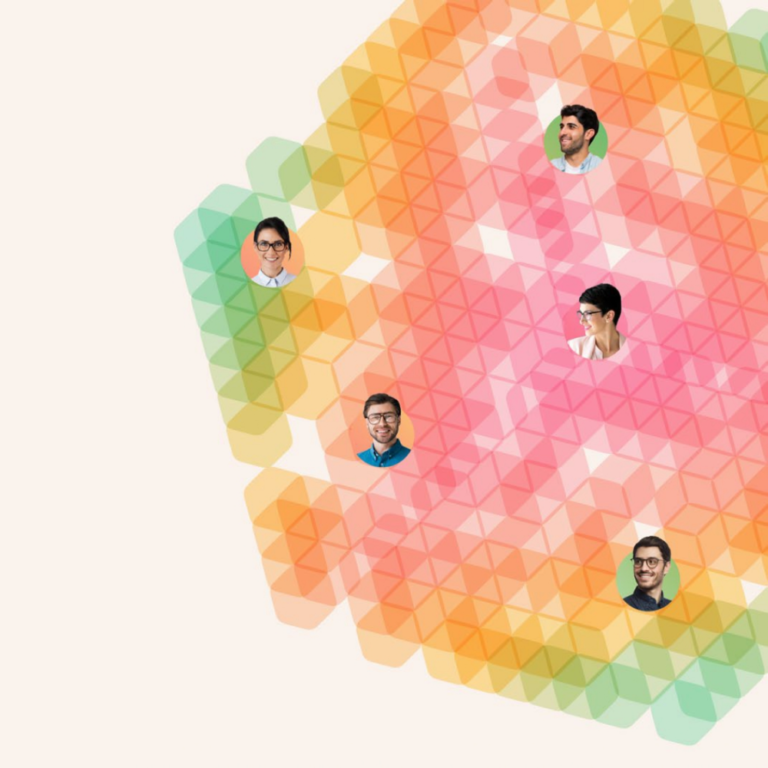Knowledge Kernel
Deficit Mentality
ESTIMATED READING TIME: 10 MIN
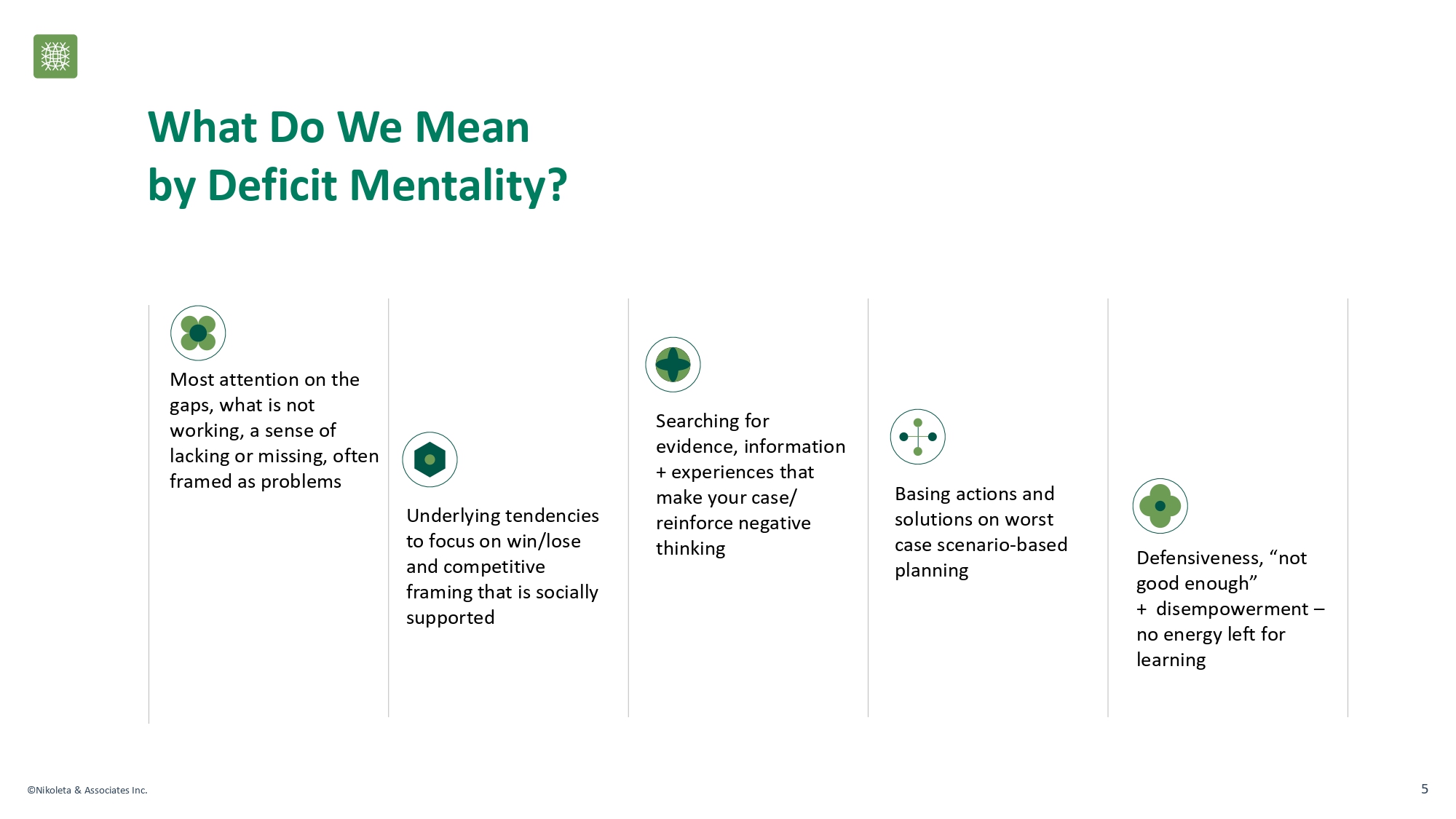
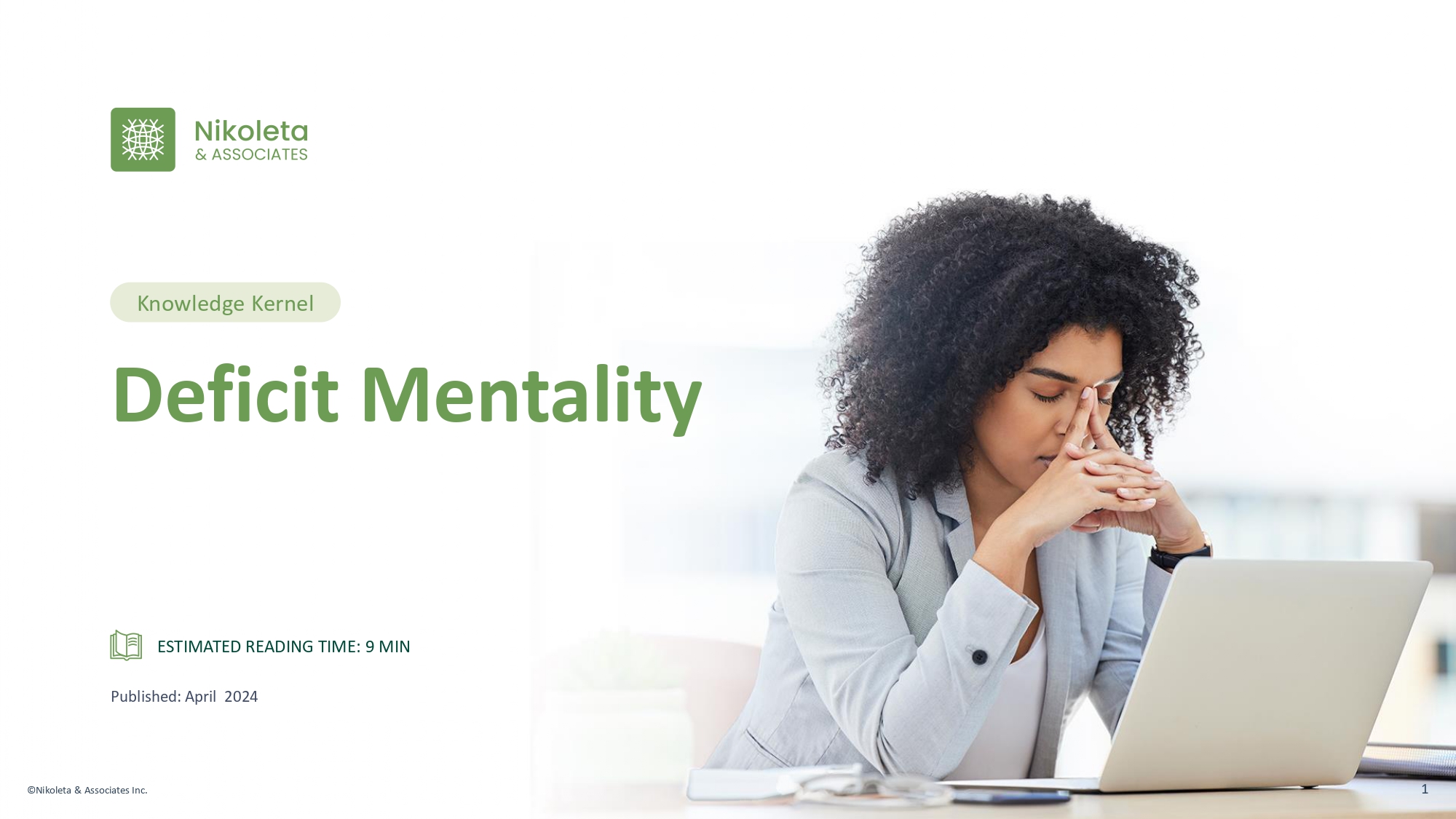
In this Knowledge Kernel, we dive deeper into:
- Understanding Deficit Mentality: Acknowledging and creating shared awareness of tendencies towards negativity, skepticism, and self-doubt that can impact decision-making and behavior.
- Growth Mindset: Encouraging a shift from a deficit mindset to a growth mindset, being open to possibilities, adaptability, and focusing on learning.
- Reframing Imposter Syndrome: Translating feelings of inadequacy and self-doubt into opportunities to explore and understand one’s capabilities, embracing continuous learning and growth rather than focusing on mistakes, blame, or thoughts of inability.
- Uplifting the Human Experience: Promoting transparency, collaboration, and trust by reframing perspectives and leading with authenticity to create greater trust within yourself and your teams.
- Strengths-Based Approach: Fostering self-empowerment by recognizing and building awareness of individual strengths within teams as an alternative to focusing solely on improvements over natural talents.
Thank You for Your Interest in This Knowledge Kernel.
Introduction
We live in a world steeped in worst-case scenario framing and fear-mongering, for some of us this can lead to views through jade-colored glasses, which is commonly referred to as a deficit mentality.
Deficit mentality can show up in many forms and is often encouraged and shaped by our environment. In our experiences, this can include a wiring or inclination towards inner soundtracks of negativity, gloominess, skepticism often accompanied by anxiety and paranoia.
This space is often and commonly referred to conceptually as a scarcity mindset. This way of thinking is frequently associated with underlying tendencies of focusing on win/ lose and competitive framing, as well as perceptions of what is lacking or missing.
In a business environment, this can be amplified during times of restructuring, change and transformation, with uncertainty encouraging a range of emotional responses linked to this concept, sometimes in forms of freezing up, opting out, defensiveness or self-disempowerment.
We acknowledge that as individuals we may or may not always be aware of these reactions and how a deficit mindset can influence our judgement, decision-making or the environment we create for one another. And in some cases, it may even be easier to choose to sit in the frame of a deficit mindset than
“do the work,”
actively reflecting and reframing our views. However, it is a possibility, one that takes vigilance, healing, and learning.
In this case, we are not only talking about concepts like celebrating progress, but about the way in which you can shape how you view the world. If you are open, we wanted to open the conversation and share our experience of what is possible.
We understand that this can be experienced as like wishful thinking or even naive, although, as context,
we are not looking to perpetuate toxic positivity. Instead, we want to propose how our mindsets, often not explored, impact our ability to authentically lead, and that we see as worthwhile to question and reflect on our tendencies and habits.
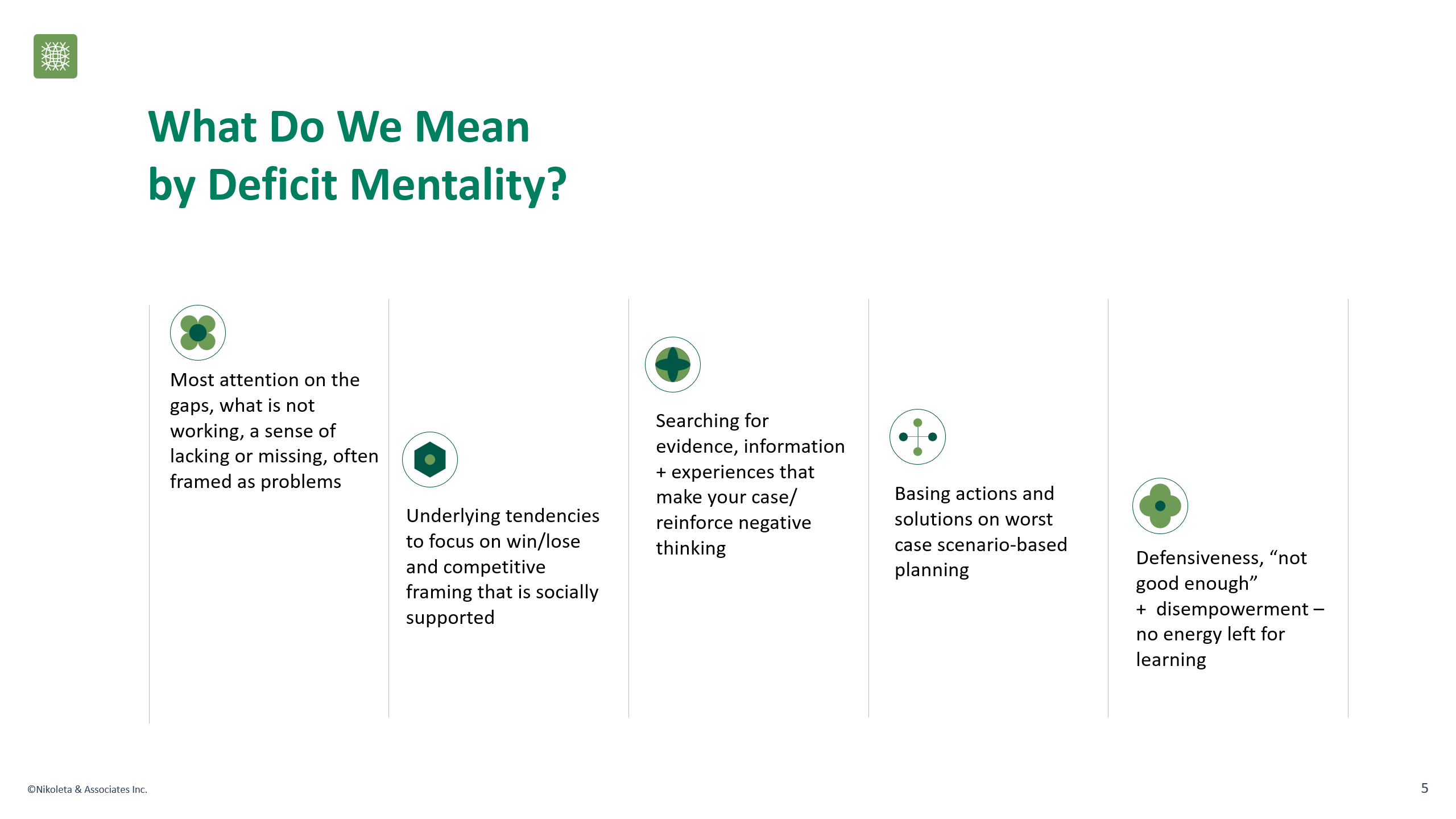

Imposter Syndrome
Imposter Syndrome has become a widely spoken about term commonly associated with high-achieving individuals experiencing self-doubt of intellect, skills, or accomplishments. Often characterized by feeling like “a fraud” or “a phony,” this doubt of personal abilities creates a perception of lack of belonging or undeserving of successes. We see as linked to the concept of deficit mentality.
When we as humans, can get stuck in framings of “imposterism,” perpetuating narratives that have adverse effects such as labelling and putting ourselves in boxes. There is also truth to self-fulfilling prophecies that can come into play.
We like to share that exactly at these moments as it is important to remind ourselves that we are capable regardless of how we feel or what we thinking can happen. We are capable of learning, growing, and understanding, and these are lifelong pursuits that do not have an “end date” or are accomplished by a certain age or milestone.
We also would like to acknowledge that if you are experiencing imposter syndrome or a similar form of thinking, you are not alone when it comes these experiences. We often share a fundamental, that We are More Similar than Different. Starting in this place we are first and foremost human beings and within this space that includes our full emotional suite where we likely all can relate to instances or feelings related to the spaces that are commonly labeled as examples of a deficit mindset.
It is a choice to focus on pure play learning (easier said than done), what you can move forward with, not the fear of mistakes or being perceived as “wrong.” When we share this, it is not meant to belittle emotions of anxiety, frustration etc., instead it offers a starting point for a reframe.
So,
what’s the reframe?
Shifting from a Deficit Mindset to a Growth Mindset, or what we often call Growth Attitude, can be a worthwhile pursuit. This can be realized by encouraging ourselves to be open and look for possibilities, exercising an attitude of adaptability and learning. Examples of orientation in this reframe can include
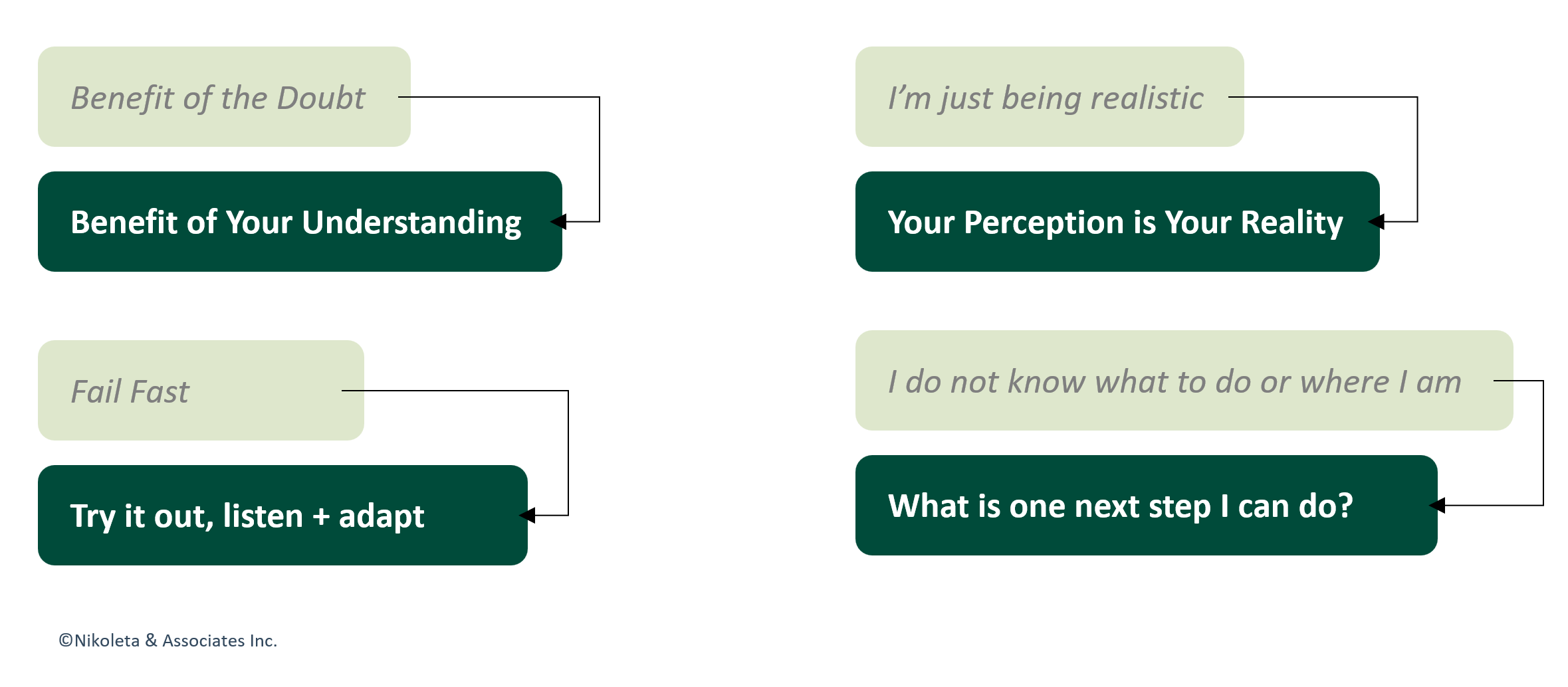
We can understand inclinations to start from a place of skepticism, especially when influenced by past experiences and historical data.
However, living in speculation land where what ifs can rule us, does not create favourable environments for transparency, collaboration, and trust. Instead, look to give others the benefit of your understanding, start by listening, asking, and exploring.
5 people, 5 different meetings, this is a sentiment we often share to illustrate our perspective, Your Perception is Your Reality. There is no one way or right way, especially where there are people involved and in business this is always the case.
We each will have different things that resonate for us, priorities, implications, and emotional responses, and being aware of this and acknowledge this will provide a better understanding of the human dynamics involved during time of organizational change.
Less interest in ‘who is to blame’ and more on ‘how do we move forward.” This avoids lack of spin and focus on creating cultures of shame and environments where individuals fear “making mistakes.”
In some environments this can be referred to as trial and error or experimental, whereby the intention is to be more innovative, yet still highlights an element of failure.
Instead, we choose to focus on the learning, because where there is trepidation, innovation can be impacted. And, in this reframe we can shift from “what if I am wrong” to “what can I/we learn and apply next time.”
Sometimes we don’t always have the clarity we would like to but need to keep moving forward to avoid being stuck or frozen. Although our actions may freeze, time does not.
Instead of seeking all the answers before moving forward (something that likely will not happen), knowing your next step is more than enough.
And when that may not be available to you, understanding what you don’t want to do or who you can talk to for alignment can help you move ahead.
Worst Case Scenario is Also One Possibility
Being mindful to perpetuate positive thinking throughout this piece, we also want to acknowledge that the worst-case scenario framing is also an option that can be chosen.
A question is: What makes it the worst for you?
Ideas that stem from this place can be possibilities that lead to unfavorable outcomes; and that there is a time and place for this kind of mentality, often framed in business as risk management, the reality is, etc. And while this is definitely one factor to consider, it is for sure not the only one.
Being mindful to perpetuate positive thinking throughout this piece, we also want to acknowledge that the worst-case scenario framing is also an option that can be chosen.
A question is: What makes it the worst for you?
Ideas that stem from this place can be possibilities that lead to unfavorable outcomes; and that there is a time and place for this kind of mentality, often framed in business as risk management, the reality is, etc. And while this is definitely one factor to consider, it is for sure not the only one.
Experience Shaping Design Considerations
01
Seek to Understand
(Start with Self)
It can be easier to jump to problem/ solution mode rather than a place of listening and understanding. What comes along with jumping to the former, is that we assume that there is always a problem, and in that frame often equate people to problems.
In our experience that is a green flag for reflection moment. All of us would prefer that the starting point is not that we are a problem. We do want to be explored with and collaborated with.
This is why we often share to lead as an explorer. This often starts with understanding your thoughts, reactions and way you process experiences first. Understanding how you can effectively learn, digest and clarify will go a long way. This can in turn create understanding of the importance of acknowledging that our perception is our own, it leaves space to understand that experiences may differ team member to team member.
02
Beyond Positive + Negative Emotions
As we share in our perspective Positive & Negative Emotions: Go Beyond, labelling emotions in this dichotomy does not capture the richness of our emotional lives.
When we experience unpleasant emotions, this can be a signal that there is work for us to do and does not mean that the emotion itself is bad.
The more we can shape this understanding within ourselves and our teams, the better we can understand and relate to one another and approach a situation or challenge and determine what needs to be done to move forward together.
Unpleasant and even pleasant emotions will come and go, our understanding of them has more staying power.
03
Truth Builds Trust
(Your Experience is Where to Start)
Leading with a deficit mindset may impact our ability to share our truth, which can be experienced as a lack of transparency, creating an appearance of suppressing and/or hiding information and context with team members.
Instead, focus on sharing your experience, this does not always mean “being right” or “knowing everything,” it comes from a space of genuine intention to share where you are and as a byproduct others can also share their experience.
We acknowledge that this may be difficult at times, especially when there is sensitive information involved, but consider what you can share – your experience. Even when you do not have all of the answers this provides a sense of where you are to your team which
creates an environment where trust, innovation, sharing and collaboration are more possible.
04
Strengths- Based
Approach
A common way to re-frame a deficit mentality, is embedding a strengths- based approach into your team. Recently, the work of Don Clifton and Clifton Strengths is well known in business. In our Strengths Knowledge Kernel , we share the value of intentionally understanding our
strengths and how to apply them.
Strengths are often overlooked in environments that solely focus on improvement and weaknesses, creating a lack of awareness of what we are actually good at, especially when we are always focusing on “gaps” and “opportunities.”
Instead, focusing on strengths, can offer us a toolkit and recipe that can enable a way to navigate challenges, times of uncertainty, etc. By having awareness of how to tap into our strengths and build upon them in day-to-day lives can lead to a frame of self-empowerment and learning. – a more effective alternative to a frame of deficit.
We invite you to join us in exploring these concepts further and engaging in a dialogue about the impact our mindset can have in shaping our experience and choices. Given our experience in this area, we welcome the opportunity to continue the conversation further. Please feel free to send me a note to discuss or to suggest other topics of interest.
Thank you for reading, and we look forward to hearing from you soon.




